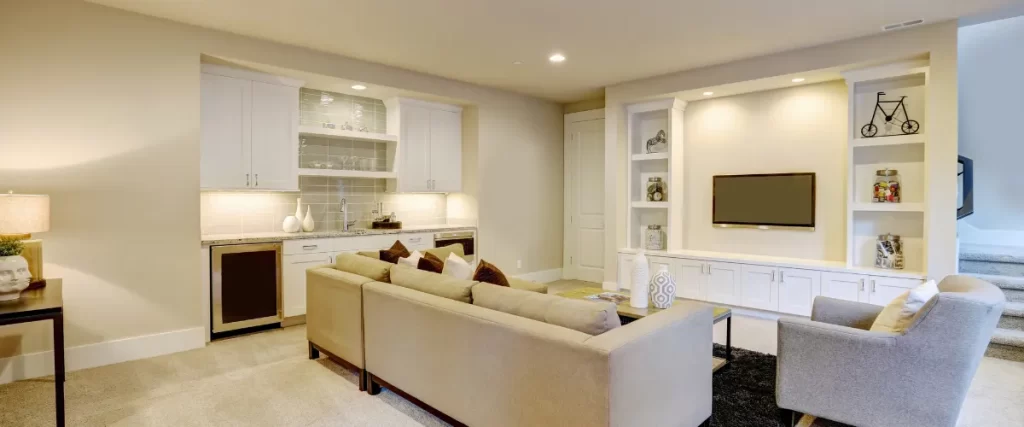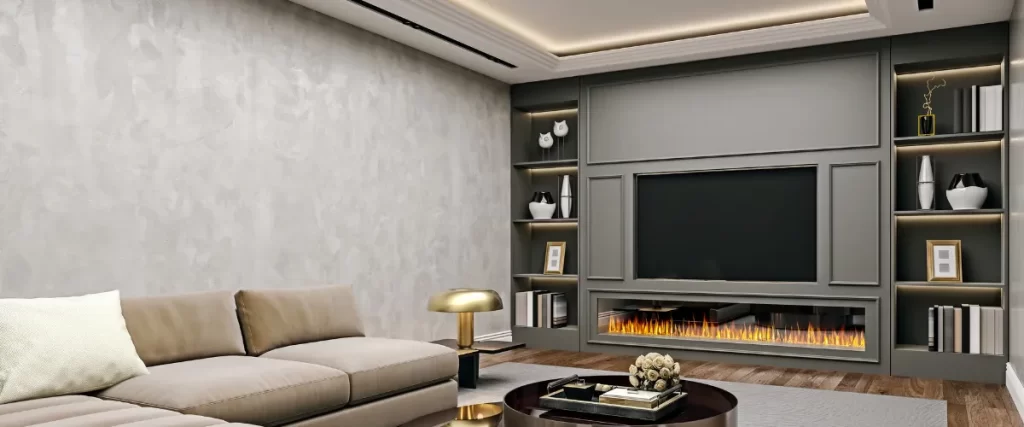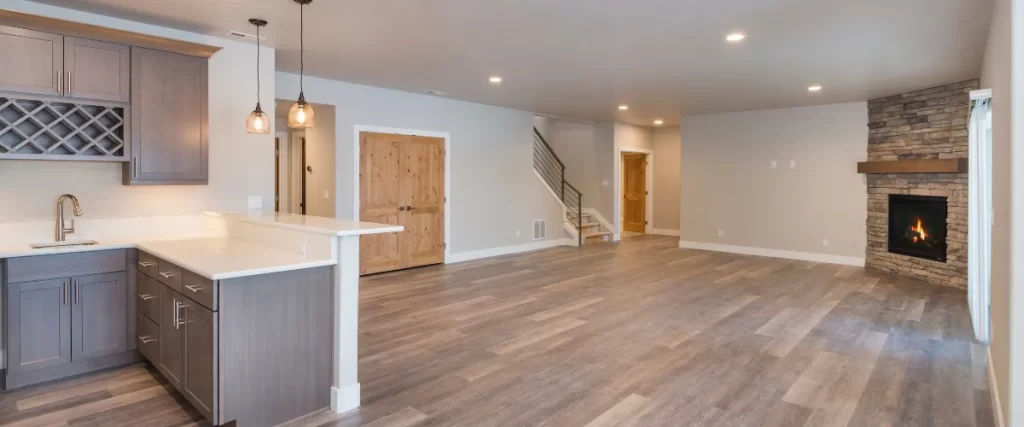If you’re like many Omaha homeowners, you’ve probably looked at your unfinished (or underused) basement and thought, “What if I could turn this into extra income?” With housing demand rising across the city, and property values following suit, the idea of converting your basement into a legal rental unit has never been more appealing.
But here’s the thing: in Omaha, you can’t just throw a bed and a mini-fridge downstairs and call it good. You need to navigate specific building codes, zoning laws, and safety regulations. The good news?
You’re in the right place. This guide is packed with everything you need to know to transform your basement legally, safely, and profitably.
Let’s dive in.

Why Omaha Homeowners Are Converting Basements Into Rentals
Before we jump into the how-to, let’s talk about why this is such a hot topic locally:
Rising Cost of Living: Many Omaha homeowners are looking for ways to offset rising expenses.
University Growth: Creighton and UNO bring thousands of students to town each year, creating a steady rental demand.
Short-Term Rentals: With the College World Series and other big events, Airbnb-style rentals are becoming super popular here.
Generational Living: More families are building “in-law suites” to house elderly parents or adult children.
Your basement isn’t just wasted space — it’s a hidden opportunity.
Understanding Omaha’s Building and Zoning Regulations
First things first: Omaha has strict codes for any secondary dwelling unit (which is exactly what your basement rental would be). Here are the basics you’ll need to understand:
Zoning
You must verify that your property is zoned for a rental. Omaha generally allows accessory dwelling units (ADUs) in most residential areas, but every neighborhood is a little different. You can check your zoning on the City of Omaha Planning Department’s website.
Building Permits
Before starting any work, you’ll need to apply for a building permit. Your permit must cover key aspects of the project. Renovations often require special attention, especially for complex tasks like structural changes, which may involve adding walls, doors, or windows.
Plumbing work is essential if you’re planning to add a kitchen or bathroom, while electrical work is crucial for ensuring safety and functionality. Additionally, modifications to HVAC systems may be necessary to maintain proper heating, cooling, and ventilation throughout the space.
Safety Requirements
Your rental must meet specific safety codes:
Ceiling Height: At least 7 feet. Some older Omaha homes may need excavation or adjustments.
Egress Windows: You must have an escape window in any sleeping area — big enough for an adult to climb out of.
Fire Safety: Proper smoke alarms, carbon monoxide detectors, and possibly a secondary exit, depending on the layout.
Skipping these steps isn’t an option if you want to stay legal (and avoid massive fines).
Planning Your Basement Conversion: Step-by-Step
Now that you know the rules, let’s talk about the fun stuff: designing your space!
Step 1: Set Your Budget
A basement conversion in Omaha can cost anywhere from $30,000 to $80,000, depending on size and features. Always budget an extra 10–15% for unexpected issues, like hidden water damage or foundation repairs (thanks, Midwest weather).
Step 2: Plan the Layout
At a minimum, a rentable unit typically requires a private or clearly separated entrance, a full bathroom, a sleeping area with an egress window, a living area, and a kitchenette or full kitchen, depending on the market you’re targeting.
Pro Tip: Open-concept layouts tend to feel bigger — a bonus in basements!
Step 3: Moisture and Insulation
Omaha’s humidity and freeze-thaw cycles mean moisture control is critical. You’ll want to:
To ensure a well-protected and energy-efficient home, start by installing a proper vapor barrier to prevent moisture issues. Additionally, waterproofing the foundation is crucial to protect against water damage and maintain structural integrity.
Finally, adding spray foam insulation will not only improve energy efficiency but also help regulate indoor temperature, making your home more comfortable year-round.
Ignoring moisture issues will wreck your investment.
Step 4: Utilities and Appliances
If your tenant will pay their own utilities, you’ll need separate meters or at least a clear way to divide the bills. You may also need:
This property offers several standout features that make it highly appealing. It includes a separate HVAC zone for personalized climate control, ensuring comfort throughout the year. An efficient water heater adds to the convenience and energy savings. Additionally, the in-unit laundry is a huge selling point, providing practicality and ease for everyday living.

Best Materials for Basement Rental Units in Omaha
Given our climate, choosing the right materials matters. Here’s what we recommend:
For flooring, luxury vinyl plank (LVP) is an excellent choice due to its waterproof and durable nature. The walls should feature moisture-resistant drywall, often referred to as “green board,” to help prevent mold. For insulation, closed-cell spray foam is ideal as it provides superior temperature control, ensuring comfort and efficiency.
Spend a little more upfront and you’ll save a fortune in repairs later.
Top Manufacturers for Basement Conversion Materials
When you’re investing in a basement conversion, you want materials that stand the test of time (and the Omaha weather). Here’s a quick list of trusted manufacturers:
Choosing the right brand is just as important as picking the right material.
Owens Corning: Excellent for insulation, especially their closed-cell spray foam.
Shaw Floors: Known for high-quality, waterproof vinyl plank flooring.
CertainTeed: Reliable drywall options, including moisture-resistant “green board.”
Pella Windows: Their egress windows are designed to handle Nebraska’s tough winters.
Delta Faucets: Durable, stylish, and built for long-term reliability in rental units.
Common Challenges (And How to Avoid Them)
1. Low Ceilings
If your basement ceilings are under 7 feet, you might need to excavate or creatively design around the problem with clever lighting and furniture.
2. Water Issues
Before finishing anything, get a professional basement waterproofing consultation. Trust us — Omaha’s spring floods are no joke.
3. Permitting Delays
Expect a little red tape. Start early and work closely with the City of Omaha’s Planning Department.
4. Noise Concerns
Install acoustic insulation between the main floor and the basement to avoid tenant complaints.
FAQ: Converting a Basement to a Rental in Omaha
Is it legal to rent out my basement in Omaha?
Yes, as long as you follow local zoning and building codes.
Do I need an egress window in the basement bedroom?
Absolutely. It’s a safety requirement — not an option.
How much can I charge for a basement rental in Omaha?
It varies, but most basement units in good neighborhoods rent for $800–$1,200/month.
How long does the conversion process take?
From planning to final inspections, expect at least 4–6 months.
Can I DIY the basement conversion?
You can do parts yourself, but certain things (like electrical and plumbing) must be done by licensed professionals to pass inspections.

Final Thoughts: Unlock Your Basement’s Full Potential
Converting your Omaha basement into a legal rental unit is a big project — but it’s also one of the smartest investments you can make right now. Whether you’re looking to supplement your mortgage, save for retirement, or just make better use of your space, the opportunities are too good to ignore.
The key? Do it right the first time. Follow Omaha’s rules, choose high-quality materials, and plan your project carefully. Your future self (and your wallet) will thank you.
Ready to start? Have questions about what to do next? Contact us at (402) 661-0910 — we’re here to help you turn your basement into an income-producing powerhouse without the stress.
